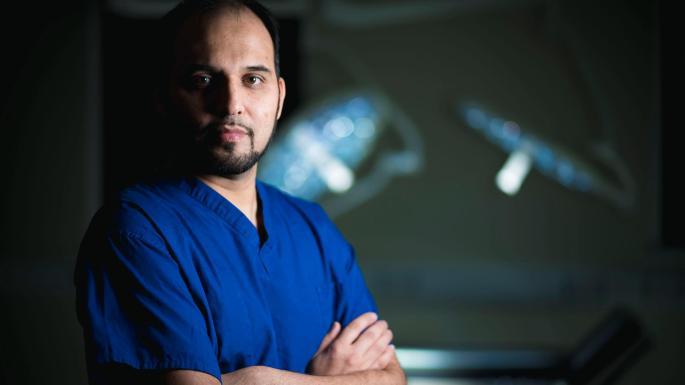Staffordshire soldier’s brain tumour cancer ‘no longer visible’

Cameron Ray, 21, featured in the latest series of Surgeons: At the Edge of Life on the BBC as he underwent surgery to remove a brain tumour under the care of Ismail Ughratdar at the Queen Elizabeth Hospital Birmingham (QEHB).
Now, Cameron has been told that his cancer is ‘no longer visible’ on scans. Cameron had previously been given just three years to live before having the tumour removed at QEHB last year.
Cameron, who was diagnosed with a brain tumour in February 2018 whilst training as an army medic at the Whittington Barracks near Lichfield, said: “I was quite shocked and surprised that they said they can’t see the tumour at all, there are no cancerous cells where the tumour was and, if it continues like this, they’re happy to put me into remission which is something we never thought we’d ever hear.”
Cameron was treated by Ismail Ughratdar (Ish) whilst at the QEHB, with Ish removing as much of Cameron’s tumour as possible through a procedure called an awake craniotomy. Cameron was awake throughout much of the procedure and was given word tasks by a speech therapist, which in turn helped to guide Ish away from the areas that he had to avoid when removing the tumour.

Surgeon Ismail Ughratdar
Ish said: "I am delighted to hear the good news that Cameron's cancer is no longer visible on scans and I wish him all the best for the future. Awake craniotomy operations allow us to remove as much of the tumour as possible, meaning that subsequent treatments are more likely to succeed as the tumour has been reduced in size. It's wonderful that Cameron is able to do all of those things that he enjoyed doing before."
When Ish and Cameron appeared together on BBC Breakfast, Ish said: “Complications within the surgery would have led Cameron to be paralysed down one side, or have speech problems.
“Brain tumours can look very similar to normal brain tissues and there’s no demarcation between the tumour and the brain. The tumour infiltrates areas of function so it’s vital that we’re able to test his ability to speak.”
When asked about the nature of awake craniotomies, and the difficulty of the procedure, Ismail said: “There’s a lot of responsibility to do the very best for our patients. We’re very lucky to be funded by the Charity to buy specialist equipment to map the surgery and to make it as safe as possible. We’ve got the technology and we’re trained very well, and this combined with the amazing team that we have at the hospital means that we’re able to do great things.”
Thanks to Ish’s expertise, Cameron did not experience any loss of function, saying: “I can still do absolutely everything I could do before due to my amazing surgeon.”
Since Cameron's operation at the Queen Elizabeth Hospital Birmingham he has received further treatment at the Royal Preston Hospital.
The Giles’ Trust is the brain tumour research fund within the Queen Elizabeth Hospital Birmingham Charity, and was set up by Ashley Giles and his wife Stine after she was successfully treated for brain tumours at the Queen Elizabeth Hospital Birmingham.
The Giles’ Trust has raised over £500,000 since 2015 and has funded a research nurse to help to carry out world-leading brain tumour research at the hospital.
Cathryn Worth, Fundraising Manager for the Queen Elizabeth Hospital Birmingham Charity, said: “It is wonderful news that Cameron’s cancer is now not visible on scans. The Giles’ Trust is incredibly proud to support the amazing work of clinicians like Ish here at the Queen Elizabeth Hospital Birmingham as they save lives through their expertise. By funding more equipment, research and facilities, The Giles’ Trust hopes to save even more lives of patients with brain tumours.
“Brain tumours are the biggest cancer killer of children and adults under 40, yet only 1% of all research funding into cancer goes into brain tumours. The Giles’ Trust has already been able to make a difference to patients like Cameron, but with your help we will be able to save even more lives.”